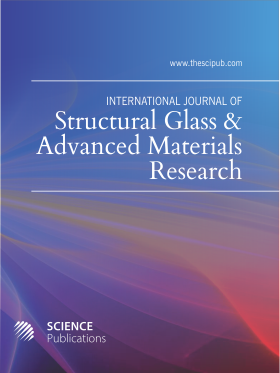International Journal of Structural Glass and Advanced Materials Research
Current Challenges in Materials Design
Description
Design means to analyse, compare, manage and connect a large amount of data, ideas, and information to develop, expand and materialize a starting idea, which was born to solve the initial problem. In this process, the engineer is the bridge between the creative moment and its real implementation. The evolutionary characteristic of the design procedure often requires an iterative approach. Different professionals together need to improve the solution step by step towards best results. Indeed, engineering design is never an individual task but a team effort in which collaboration is the most powerful key of success. In this complex reality, the potential of modern technology highlights the need of a strong background knowledge capable of supporting and developing the engineering sensibility to control the whole design procedure.
In the
last decades, the development of technology has revolutionized the design
approach: Computational Models, Building Information Modelling, Performance
Based Design, Smart Materials, Microstructures are the dominating trends of
this field.
In this framework, the use of structural glass represents a key example. Despite it is a well-known brittle material with limited tensile resistance, several studies and design applications proved that, especially once combined with other materials, glass can offer very interesting structural performances. Laminates and meta-materials are other examples of modern engineered materials. Indeed, the global structural behavior of laminates depends on the lamination stacking sequence, while the microstructure or lattice of meta-materials can provide a tuned property on the macro-scale.
This special issue aims to collect high-quality articles presenting original research results, as well as review articles of exceptional merit dealing with new materials design.
In this regard, the special issue includes also a selection of research articles presented at the 6th International Workshop on Design for Civil and Environmental Engineering, Cagliari (Italy), November, 9-11, 2017 (DCEE 2017).
Potential topics of submitted papers include, but are not
limited to the following:
1. New Engineered Materials:
- Composites, Laminates, Meta-materials, Hybrid materials
2. Design methodology:
- Need of Integration and interdisciplinary
- Form finding/Parametric Design, Optimization
- Influence from other sciences (e.g. biology, neuroscience)
3. Interdisciplinary challenges in engineering design:
- Structure (Heritage structures, Civil/structural, new materials)
- Systems (Indoor climate/energy, District and urban scale, Resilience, Energy Harvesting)
- Life Cycle Assessment in engineering design
4. Design education in engineering design
- Computer aided design (numerical models for analysis)
- Education to integrated design
- Modern technologies for teaching
Guest Editors
Chiara Bedon, University of Trieste, Italy
Chiara Bedon is Assistant Professor of Structural Engineering at the University of Trieste (Italy). Her research interests include design and structural analysis of glass elements and assemblies, as well as numerical analysis of glass, timber, composite structural systems under exceptional loading conditions, including seismic events or fire loading.
Fausto Mistretta, University of Cagliari, Italy
Fausto Mistretta is Assistant Professor of Structural Engineering at the University of Cagliari (Italy). He is interested in NTD techniques, structural restoration and retrofit of bridges and buildings, historical materials in structural engineering, fired exposure structures evaluation and design, reinforced concrete and steel structures design. He is also founder and owner of the company Secured Solutions LTD - Spin-off of the University of Cagliari.
Mauro Sassu, University of Cagliari, Italy
Mauro Sassu is Associate Professor of Structural Engineering at the University of Cagliari (Italy), formerly at the University of Pisa (Italy). Author of about 180 publications, his research interests include the structural behaviour of historic constructions, seismic consolidation and structural health monitoring of masonry structures, fire resistance of masonry structures, forensic engineering.
Flavio Stochino, University of Cagliari, Italy
Flavio Stochino is R&D manager at Secured
Solutions, spin off of University of Cagliari (Italy). His research deals with
computational mechanics and extreme loads (blast, impact, fire etc.) on
structures and construction materials. After his PhD, obtained in 2013 at
University of Cagliari, he has worked as Post Doc Researcher at University of
Sassari (Italy). Then he has improved his computational mechanics skills at
Technical University of Dresden (Germany) under the Dresden Junior Fellow
program.
He has produced several papers for international journals and he has participated and presented academic papers in several international conferences.
| Important Dates | |
| Submission deadline: | 31 January 2018 |
| First Round of Review: | 15 March 2018 |
| Publication Date: | 15 May 2018 |
